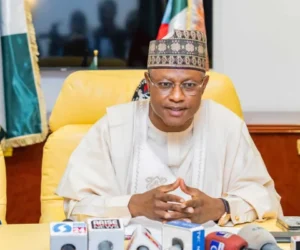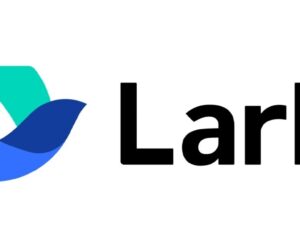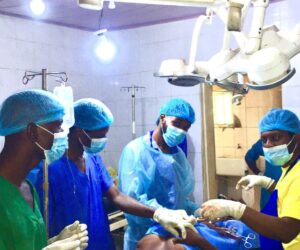The importance of electricity in our daily activities cannot be over emphasized as it enhances our quality of life socially and economically. It enhances safety and security of homes and helps Micro, Small and Medium Enterprises (MSMEs) to function effectively, all of which drive the economic growth of a nation.
The National Agency for Science and Engineering Infrastructure (NASENI) is quietly providing alternative to Nigeria’s persistent power challenge. Today, small businesses groan under the weight of generator costs, however NASENI’s Home Solar Solution is emerging as a lifeline, lighting up homes, powering micro-enterprises, and rekindling hope across underserved communities.
With the advent of electricity in Nigeria, over a century ago, the country is yet to attain sufficiency in electricity supply as it remains in short supply in some parts, while some places are not even connected to the national grid yet. For decades, epileptic electricity supply has plagued the country’s socio-economic life, frustrating households.
SPONSOR AD
Nigeria’s installed power generation capacity stands at over 13,000 megawatts, yet less than 5,000 megawatts are typically available on the national grid at any given time. For a nation of over 200 million people, this shortfall has forced millions of Nigerians to rely on petrol and diesel generators, fuelling not just machines but also air pollution, noise, and soaring living costs.
Against this backdrop and in line with President Bola Ahmed Tinubu’s Renewed Hope Agenda, NASENI, under the leadership of the Executive Vice Chairman/Chief Executive, Mr. Khalil Suleiman Halilu, has gone into partnership with an indigenous company in the alternative energy sector, Asolar Limited to manufacture NASENI Home Solar Solution for use in Nigeria’s urban, semi-urban and rural areas.
The NASENI Solar Home Solution consists of two sets of products namely: the Basic Light System and the Fan System and they are built to power homes and offices. The Basic Light System has a battery capacity of 38Wh, solar panel capacity of 20Wh and battery strength to last seven (7) hours after sunset. It consists of 20watts panel, 2 USB charging ports and a radio.
And the Fan System comes with 84Wh battery capacity, 50 watts panel capacity and lasts seven (7) hours after sunset. When fully charged, the lights can last up to 32hrs, the radio set can last up to 10hours and the Fan can also last up to 10 hours. The NASENI Home Solar Solutions are transforming lives and bringing succour to homes in rural communities who don’t have access to the national grid.
Already, the NASENI Home Solar Solution is being used in homes particularly in the rural areas. A proof of this is in Kawu Village in Bwari Area Council, Federal Capital Territory (FCT) Abuja, where a population of over 1,000 people is not connected to national grid, majority of who now depend on NASENI Home Solar Solutions to power their homes and shops.
A resident of Kawu village, Mr. Mikailu Kawu Madaki who uses the NASENI Home Solar Solution to light up his home, said it has transformed his family’s daily routine. For him, it’s about more than just lighting; it’s about peace of mind. “I bought this NASENI solar because of my children,” he said.
“When they come back from school, we turn on the light and teach them lessons. I’m really enjoying it, especially now that there is heat. When I put my fan on with my family, we enjoy it very well. Before, the heat would cause sickness sometimes, but now we sleep comfortably.”
“I use the radio in the morning to listen to BBC. I know what is happening around the world, and I advise my neighbours to buy this type of solar because it is very good” he said. Recently, NASENI supported the Light-Up Ibeju-Lekki Project, wherein it donated its Solar Home Solution and Cookstoves to constituents of Ibeju-Lekki, a fast-growing community in Lagos State.
The initiative, executed in collaboration with the Office of the Senior Special Assistant to the President on Community Engagement (South-West), was part of the Federal Government’s broader plan to decentralize energy access and empower local economies.
At the commissioning event in Ibeju-Lekki, the Senior Special Assistant to the President on Community Engagement (South-West), Moremi Ojudu, emphasized the project was a core element of President Bola Ahmed Tinubu’s Renewed Hope Agenda. According to her, the goal was not just about energy provision but about restoring dignity to ordinary Nigerians who have long lived in the shadows of power failure.
“We are bringing development to every corner, education, entrepreneurship, technology, agriculture, infrastructure and healthcare,” she said. “This programme is aimed at improving access to clean, reliable and sustainable energy at the community level, reducing the electricity burden on families and business owners while stimulating economic growth.”
For the people of Ibeju-Lekki, the impact was already visible. Households now enjoy lighting without worrying about fuel costs or generator breakdowns. Small businesses can operate longer hours. Children can read at night without the dim, flickering glow of candles or kerosene lamps.
The Executive Vice Chairman of NASENI, Khalil Suleiman Halilu, represented at the event by Chief Engineer Adesoji Oyedeji, explained that the project reflects NASENI’s philosophy of Creation, Collaboration and Commercialisation. It is not just about providing products but also about developing technology domestically, partnering with communities, and creating sustainable economic value.
“The Light-Up Ibeju-Lekki Project perfectly embodies the 3Cs of NASENI, which align closely with President Bola Ahmed Tinubu’s visionary Renewed Hope Agenda,” Halilu said. “This project is a shining example of effective collaboration, a partnership between the government, local communities, and agencies like NASENI, working together to create new, high-quality products and technologies.”
The Home Solar Solutions are designed to empower small businesses, support education, improve health outcomes, and stimulate rural entrepreneurship. The systems eliminate the need for costly generators, helping families and businesses save money while reducing carbon emissions.
The broader goal is to create a sustainable domestic value chain that moves from manufacturing to local installation, maintenance, and end-user adoption. This holistic model ensures that the benefits of the technology are not just imported but are developed, delivered, and maintained by Nigerians for Nigerians.
In a nation where energy poverty affects millions, NASENI’s Solar Solutions offer a glimpse of what is possible when innovation meets public need. The Agency’s work complements national efforts to diversify energy sources and reduce the strain on Nigeria’s failing grid. It also aligns with global climate goals, positioning Nigeria as a serious player in the transition to renewable energy.
As more communities like Ibeju-Lekki embrace solar technology, the ripple effects are beginning to show. Markets can stay open later. Students can study at night without risking their health. Rural clinics can refrigerate medicines. And people like Mr. Kawu can sleep through the night without worrying about heat-induced illnesses or fuel shortages.
As NASENI continues to scale production and roll out more products nationwide, the message is clear, Nigeria’s power problem will not be solved overnight, but it can be tackled community by community, solar products and solar panels until the darkness begins to fade.







